Are you sick and tired of worrying yourself to death? Do you want therapies that work, ones that would provide you with long-term relief and allow you to take your life back? Stop right there. In this detailed guide, I’ll help you explore the realm of easy anxiety treatments and provide you with expert advice on how to beat your anxiety and finally feel at peace with the world.
Millions of individuals all around the world suffer from anxiety, and it can severely impact their quality of life. The spectrum of anxiety disorders includes GAD, social anxiety, panic disorder, and others. The good news is that anxiety has many effective treatments. You can easily break its grasp with the correct help and encouragement. This article will discuss helpful methods for dealing with anxiety, including both professional treatment and self-help measures.
If you wish to lead a more positive and fulfilling life, away from stress, anxiety, and depression, follow the Guilt Free Mind blog. The subscription option is present in the sidebar. If you like watching videos, subscribe to the YouTube channel of Guilt Free Mind. Do not forget to ring the notification bell.
Table of Contents
Anxiety treatments:
Cognitive-Behavioral Therapy (CBT) is one of the evidence-based anxiety treatments I’ll be discussing; it helps patients recognize and change unhelpful patterns of thought and behavior. I’ll also discuss available medications, their advantages, and any caveats you should be aware of.
However, conventional treatments for anxiety are insufficient. Mindfulness, meditation, yoga, and natural cures are all potential complementary modalities to conventional care. Using these alternative methods, you can train your mind to be more at peace and more resistant to anxiety.
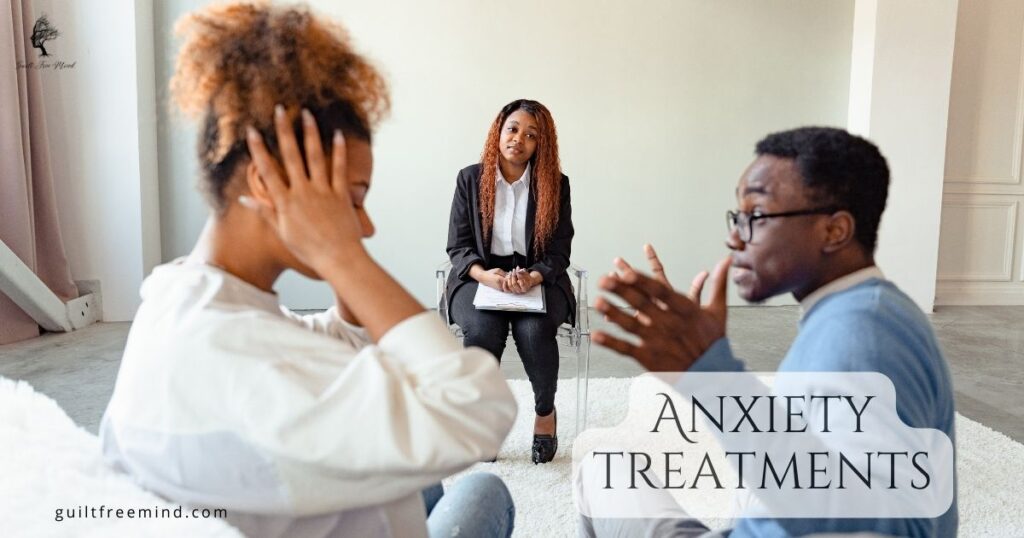
In addition to discussing conventional and alternative methods of care, I will also provide you with tools for self-care. You’ll learn a variety of effective strategies, from adjusting your daily routine and practicing relaxation techniques to enlisting the help of loved ones, for dealing with anxiety on your terms. In addition, I will assist you in developing a personalized set of resources to deal with your anxiety. This set of resources can help you deal with stressful situations, take care of yourself, and overcome your anxiety. With these tactics, you will be better able to deal with anxiety in the short term and as part of a long-term management strategy.
Worrying yourself to death won’t get you anywhere. You can rid yourself of anxiety and embrace a happier, more tranquil future with the help of effective anxiety treatments and coping mechanisms. Let’s take this trip together, learning about and trying out various anxiety therapies so we can overcome it for good.
In what ways does one suffer from anxiety?
Anxiety occurs as your body reacts to stress. It’s a state of mind characterized by apprehension or unease, the origins of which may lie anywhere from heredity to the external environment to chemical imbalances in the brain. Anxiety often manifests itself in these ways:
extreme nervousness
- Restlessness
- Fatigue
- Headache
- Hurting tummy
- Insomnia
- Concentration issues
- Sweating
- Rapid heartbeat
- Self-consciousness
Anxiety, though, can take many forms, and it’s vital to remember that. One person may get butterflies, while another may suffer panic attacks, bad dreams, or distressing thoughts. However, anxiety disorders are not the same as normal nervousness. Anxiety over novel or unpleasant situations is normal, but it becomes problematic when it becomes excessive or out of control and interferes with daily living.
Disorders of anxiety include:
- Panic attack distress after a severe event;
- PTSD
- OCD is short for obsessive-compulsive disorder.
- Fear of Being Left Alone
- Fear of missing home
- “GAD” refers to “generalized anxiety disorder.”
- Disorder of Social Anxiety
How common is the feeling of dread?
The Anxiety and Depression Association of America estimates that 40 million Americans, or 18.1% of the adult population, suffer from an anxiety disorder. 36% don’t make it through without any help. Seventy-six million people all across the world have been registered with additional cases of anxiety disorder since the COVID-19 pandemic began. More women than men have experienced the increase. According to studies, Black and African American people experienced the greatest jump in panic attacks right when the pandemic began.
Anxiety: Its Roots and What Sets It Off
Biological, psychological, and environmental variables are all potential causes of anxiety. The first step in properly managing and treating anxiety is understanding its causes and triggers. Some of the most common causes of anxiety are as follows:
Genetics
Anxiety disorders may have a hereditary component, according to the available literature. Having a close relative who suffers from anxiety may put you at a higher risk of acquiring the disorder yourself.
Chemical Imbalances
Anxiety disorders have been linked to changes in the levels of certain chemicals in the brain. Mood and emotion regulation are largely dependent on these substances.
Exposure to trauma
Anxiety disorders can be triggered by exposure to or experience stressful events such as physical abuse, accidents, natural disasters, or combat. PTSD, or post-traumatic stress disorder, is a form of anxiety that can develop after a person goes through a stressful event.
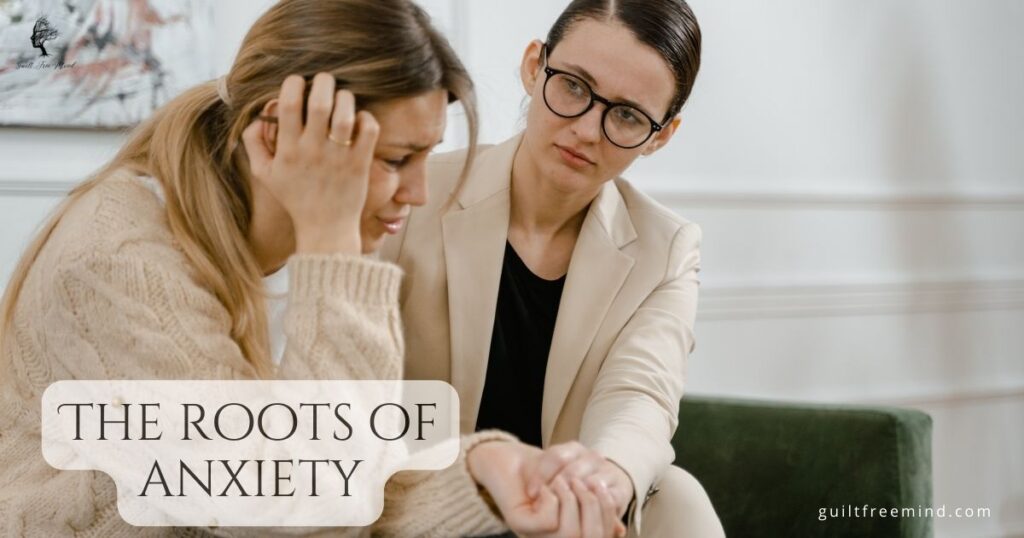
Medical illnesses
Increased anxiety has been linked to the presence of several chronic medical diseases, including cardiovascular disease, diabetes, respiratory illnesses, and hormone abnormalities. Anxiety symptoms may manifest as a result of the physical difficulties and unknowns associated with these diseases.
Substance abuse
Alcohol, drug, and medication use can all alter brain chemistry in negative ways, exacerbating anxiety symptoms during withdrawal. Anxiety can also be brought on by withdrawal from benzodiazepines or opioids.
Specific personality traits
Being very sensitive, perfectionistic, or prone to excessive worrying are all personality qualities that have been linked to an increased risk of developing anxiety disorders.
Life changes
Major life upheavals, such as losing a job, being divorced, having money problems, or losing a loved one, can have a profound effect on one’s mental health and bring on anxiety symptoms.
Chronic stress issues
Stress from work, relationships, or elsewhere can add up over time and contribute to physical and mental exhaustion, which in turn increases the risk of developing an anxiety condition.
Environment
Environmental factors like exposure to violence, living in a dysfunctional home, or a lack of social support may exacerbate anxiety symptoms.
Anxiety treatments: exploring various options
Medications for anxiety treatments
Anxiety disorders can be treated with a variety of medications. Some of these are:
Tricyclic antidepressants (TCAs)
Most anxiety disorders, except obsessive-compulsive disorder (OCD), respond well to treatment with tricyclic antidepressants (TCAs). These medications may have unwanted effects, including sleepiness, lightheadedness, and increased appetite. Imicramine and clomipramine are two common types of tricyclics.
Serotonin reuptake inhibitors SSRIs
While antidepressants like SSRIs and SNRIs are typically recommended for the management of depression, they may also be prescribed for the treatment of anxiety disorders. Nausea and erectile dysfunction are still possible side effects.
Other common medications
Prescription-only benzodiazepines, while effective, carry a considerable risk of addiction and are hence not typically used initially. Anxiety sufferers frequently take benzodiazepines like diazepam (Valium). Buspirone, beta-blockers, and monoamine oxidase inhibitors (MAOIs) are also common forms of medication used to treat anxiety.
Do not stop medication on your own
Anxiety sufferers can benefit from medications. One should use caution before abruptly discontinuing the use of anxiety medication. Brain zaps are one of the withdrawal symptoms that some drugs, notably antidepressants like SSRIs and SNRIs, can induce. These painful jolts to the head feel like lightning. If you’ve been treating your anxiety condition with antidepressants for a while and are considering making a change, it’s important to talk to your doctor about the best way to wean off of these drugs. A person should contact their doctor immediately if they have any severe, unpleasant, or unexpected side effects from taking any drugs.
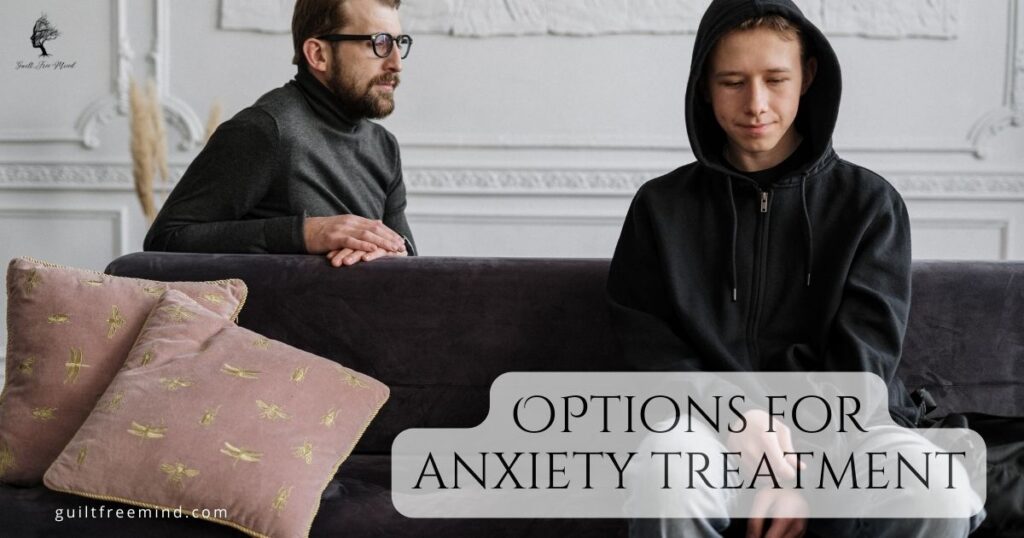
Complementary Therapies for Anxiety as an Alternative Anxiety Treatments
The addition of complementary therapies can greatly aid traditional treatments for anxiety disorders. They improve general health and supply more resources for handling anxiety. However, these are not alternatives to proven therapy like CBT or medication. Here are some of the alternative treatments for anxiety:
Mindfulness and meditation
Meditation and other mindfulness-based activities entail paying attention to the here and now without passing judgment on what you find. Relaxation and stress relief are two of the main benefits people report from meditative practices like deep breathing exercises, guided imagery, and body scans. Mindfulness training has had positive effects on well-being on several fronts.
Yoga
Physical postures, breathing techniques, and mental concentration are all part of the yoga practice. It’s great for your mental and physical health, as it helps you unwind, stretch, and build muscle. Yoga has been shown to help with anxiety, focus and concentration, and general well-being when practiced regularly.
Relaxation methods
Progressive muscle relaxation, guided imagery, and autogenic training are just a few examples of relaxation techniques that can help bring about a state of deep relaxation and, in turn, alleviate anxiety. These methods are meant to induce a state of deep relaxation across your entire being by releasing built-up stress and tension in your muscles.
Acupuncture
Acupuncture is a form of traditional Chinese medicine in which very fine needles are inserted into the body at strategic places. It improves health by reestablishing a more harmonious energy flow. There is some evidence that acupuncture can help reduce stress and anxiety.
Herbal medicines
Herbal medicines including chamomile, lavender, and passionflower are often used to alleviate anxiety because of their purported relaxing effects. These supplements might be beneficial, but before using them, it’s best to talk to a doctor about any possible drug interactions or negative effects.
Aromatherapy
Aromatherapy, or the use of plant-based essential oils, has been shown to provide calming and anxiolytic effects. Natural plant extracts and essential oils are used in this method to improve mental, physical, and spiritual wellness. The purpose is to improve both mental and physical well-being. Essential oils distilled from plant extracts can be used in a diffuser or a hot bath for inhalation. Some benefits of aromatherapy include:
- Aid in unwinding
- Aid your sleep
- Elevating one’s disposition
- Slow down your breathing and heart rate
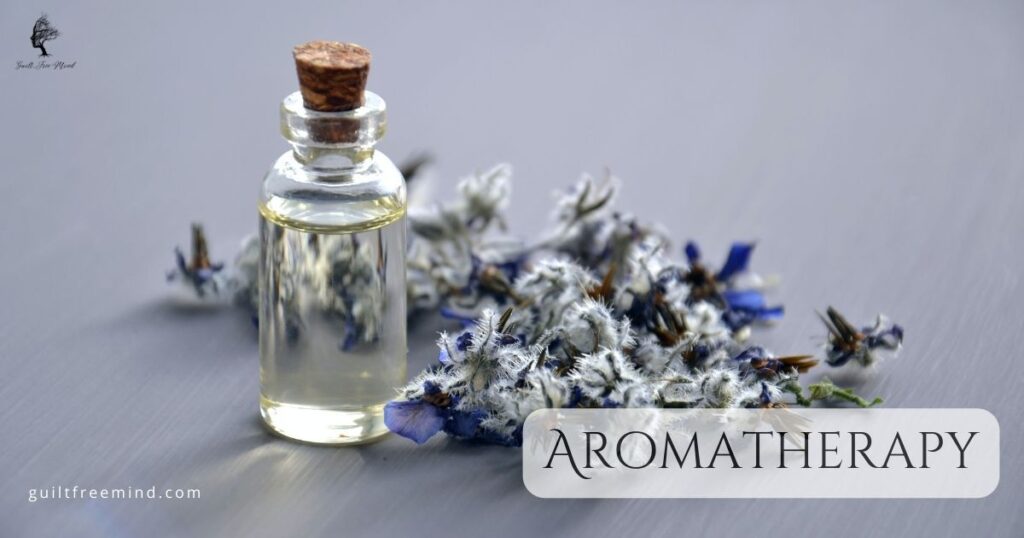
Essential oils that have been shown to help with anxiety include:
- Bergamot
- Lavender
- White sage
- Grapefruit
- Ylang Ylang
- Lavender
Exercise
Exercising regularly has several benefits, not just for your body but also for your mind. Studies have indicated high levels of physical exercise were protective against the onset of anxious symptoms in adults with anxiety disorders. There could be several causes for this. If you’re nervous about anything, exercise can help you forget about it for a while. Exercise causes an increase in heart rate and alters brain chemistry in a way that makes room for the release of neurochemicals that reduce anxiety, such as:
- Serotonin
- Gamma-aminobutyric acid (GABA)
- Brain derived neuroprotective factor (BDNF).
- Endocannabinoids
The American Psychological Association (APA) reports that regular exercise improves focus and self-control, which can alleviate some anxiety symptoms and makes this one of the most efficient anxiety treatments. What kind of physical activity is best is more of a matter of taste. High-intensity interval training (HIIT) classes and running are great ways to get your heart rate up quickly. Low-impact exercises like Pilates and yoga are good options if you are a newbie.
Art therapy
To help people express themselves and work through their emotions, art therapists encourage creative activities including painting, drawing, and sculpture. It’s a way to express yourself creatively while also de-stressing and relieving anxiety.
Stay away from the booze
Since alcohol is a sedative, it could help ease your nerves temporarily. Nonetheless, studies have shown that anxiety disorders and alcohol use disorder (AUD) are co-occurring, suggesting a connection between the two. In 2017, a review paper that analyzed 63 studies found that cutting back on alcohol helped people with anxiety and sadness. Excessive alcohol consumption may disrupt neurotransmitters, some of which are essential for a positive mental state. Anxiety symptoms may develop as a result of the disruption in the system.
While anxiety levels may momentarily rise during early sobriety, they often subside with time. Sleep homeostasis is another physiological process that alcohol impairs. sleep is a powerful tool in the fight against worry.
Put down the cigarettes
When under pressure, smokers frequently light up. Smoking is a short fix for stress, but like alcohol, it can make things worse in the long run. Studies have demonstrated that beginning smoking at a younger age increases the likelihood of later having an anxiety disorder. Smoking may also affect anxiety-related neural pathways because of the presence of nicotine and other substances. There are numerous places to begin your journey to freedom from addiction. The CDC is an organization tasked with preventing disease.
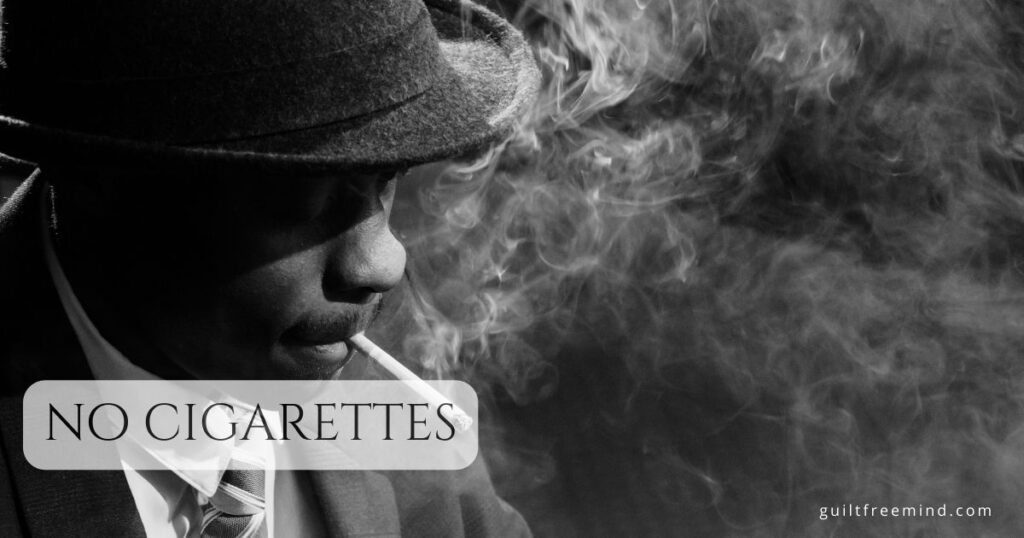
Reduce your caffeine intake
Caffeine is not helpful if you suffer from chronic anxiety. Anxious people should avoid caffeine because it may make them feel jittery and nervous. Caffeine may contribute to or exacerbate anxiety disorders, according to studies. People prone to panic attacks may also be affected. Caffeine withdrawal can be very helpful for some persons with anxiety. Caffeine’s potential to affect brain chemistry in a way similar to that of alcohol has led many to believe that the two are inextricably linked. Research from 2008, proved that coffee boosts alertness by inhibiting the action of adenosine, a neurotransmitter in the brain that contributes to sleepiness, and stimulating the production of adrenaline.
All things considered, most healthy adults can consume modest amounts of caffeine without risk. If you wish to limit or eliminate caffeine consumption, however, you should wean yourself off of it gradually. Drink water instead of beverages containing caffeine. Not only will this quench your thirst, but it will also dilute the caffeine in your system and keep you hydrated. Reducing your caffeine intake gradually over a few weeks can help you alter your habit without triggering withdrawal symptoms in your body.
Get some sleep
Time and again, science has shown that getting enough shut-eye is crucial to maintaining a healthy mind. Nearly a third of Americans, according to a 2012 poll, get less than 6 hours of sleep every night. The average adult sleeps between 7 and 9 hours every night. You can prioritize sleep by doing things like:
- Not sleeping during the daytime
- Not watching TV or focussing on reading in bed
- Not using electronic devices in bed
- not changing rooms or tossing and turning in bed because you can’t sleep
- Trying not to do things like eating a lot or smoking right before bed
- Keeping the lights out and the room cool
- Put your problems on paper before bed.
- Have a consistent nightly bedtime routine
Focus your attention and meditate
One of the primary aims of meditation is to bring one’s attention fully to the present moment, and this includes observing one’s thoughts without attaching any value to them. If you can learn to mindfully tolerate any thought and emotion, you can find inner peace and contentment. CBT includes meditation as a core practice because of its proven effectiveness in reducing stress and anxiety. Johns Hopkins University found that meditating for 30 minutes a day could help with anxiety and depression.
Take care to eat healthily
Things like low blood sugar, dehydration, or chemicals found in processed meals such as artificial flavorings, artificial colorings, and preservatives can affect mood. Alternatively, sugar-rich diet can also affect temperament. You may want to examine your diet if you notice that your anxiety spikes after eating. Eat a diet high in complex carbs, fruits, vegetables, and lean proteins, and drink plenty of water.
Herbal remedies as anxiety treatments
The traditional treatment of anxiety includes herbal remedies. Although herbal remedies aren’t an alternative for seeing a doctor or taking medicine for anxiety, they may help in some cases. Herbal treatments for anxiety should be used under the supervision of a medical practitioner due to the risk of drug interactions and the presence of potential contraindications. The following options are good for the treatment of anxiety:
- The relaxing effects of chamomile have made it a popular herbal remedy. It’s commonly used as a tea for its calming and anxiety-busting effects.
- Everyone enjoys the calming aroma of lavender. You can use it in aromatherapy, baths, or add it to the water for a more soothing experience.
- Many people find relief from their anxiety by using passionflower, which has calming properties. You can purchase it as a tea, tincture, or capsule.
- The sedative effects of valerian root make it a popular sleep aid. Facilitating relaxation may also aid in alleviating anxiety. Supplements containing valerian root are readily available.
- The mint family has a herb called lemon balm. Its calming effects have made it a staple in traditional medicine for centuries. You can make a tea out of lemon balm, or take it internally as a supplement.
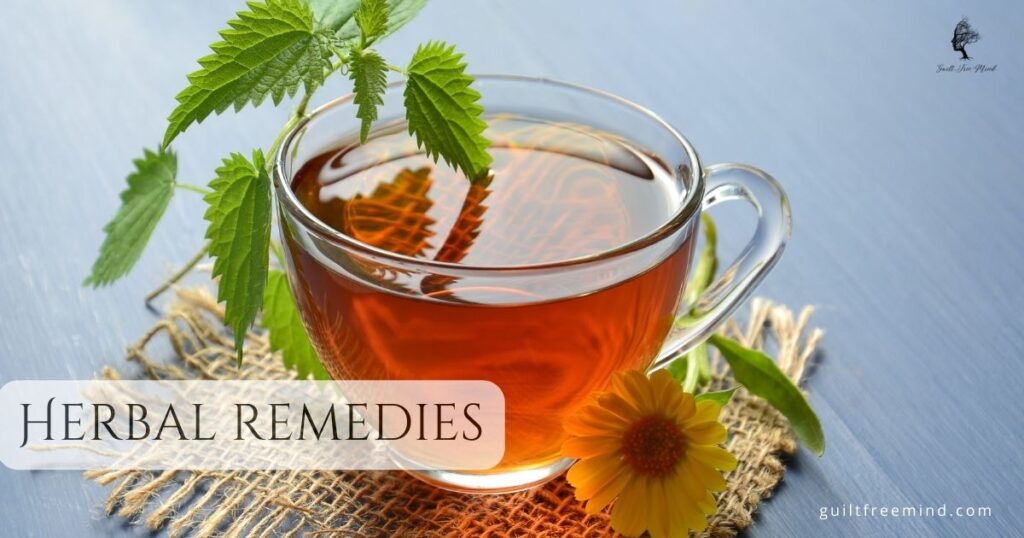
Anxiety-Relieving Stress-Reduction Methods
I have already discussed these in brief above, but here is a detailed guide. You may improve your ability to relax, regain composure, and deal with stressful situations by implementing these practices into your daily life. If you’re feeling anxious, try any of these stress-busting strategies:
Breathing Exercises:
Diaphragmatic or belly breathing exercises can trigger the body’s relaxation response and aid in anxiety reduction. Relax by taking long, deep breaths from your nose and out through your mouth, letting the air fill your lungs before releasing it.
Progressive muscle relaxation
To reduce stress and anxiety, you can try a technique called progressive muscle relaxation (PMR), which is systematically tensing and relaxing muscle areas. Focus on the sensations of relaxation as you progressively tighten and release the muscles in your body, beginning with your toes and working your way up to your head.
Mindfulness
Focusing nonjudgmentally on the present moment is at the heart of mindfulness meditation. You can create serenity and lessen worry by paying mindful attention to your inner experience and accepting it as it is. You should begin by meditating for brief periods and work up to longer sessions.
Participate in Relaxing Activities:
Do things that make you happy and help you unwind. Some examples of this kind of activity are relaxing activities like reading, listening to music, taking a hot bath, engaging in a favorite hobby, or going outside. Doing something you enjoy takes your mind off your worries and helps you unwind.
Self-care focus
Take care of your emotional and physical health by participating in self-care activities. If you need some moral support, try reaching out to people you know you can trust, whether they be friends, family, or support organizations. Discussing your problems with others can help you feel less alone and give you a new perspective.
Strategies for Managing Time and Reducing Stress
Efficient time management is one means of mitigating stress and anxiety. Make a list of what has to be done and the order. Create reasonable goals. Try journaling, keeping a gratitude diary, or indulging in some other form of creative activity to relieve stress and unwind.
Therapy and counseling options
Therapy and counseling can be very useful in the treatment of anxiety because they teach people how to recognize and cope with their symptoms. A cocktail of therapeutic measures is usually effective in treatment of anxiety problems. Some common forms of talk therapy and counseling for anxiety are as follows:
CBT
The anxiety treatment known and studied the most is cognitive-behavioral therapy (CBT). In this form of therapy, the methods for recognizing and altering unhelpful ways of thinking and behaving that exacerbate anxiety are emphasized. Through exposure treatment and other CBT techniques, patients are encouraged to gradually address anxiety-provoking situations, rather than avoiding them.
The combination of cognitive behavioral therapy (CBT) with exposure therapy is common. It entails the gradual and controlled introduction of circumstances or stimuli that are known to cause anxiety. Individuals learn to regulate their anxiety response and decrease avoidant actions through repeated exposure.
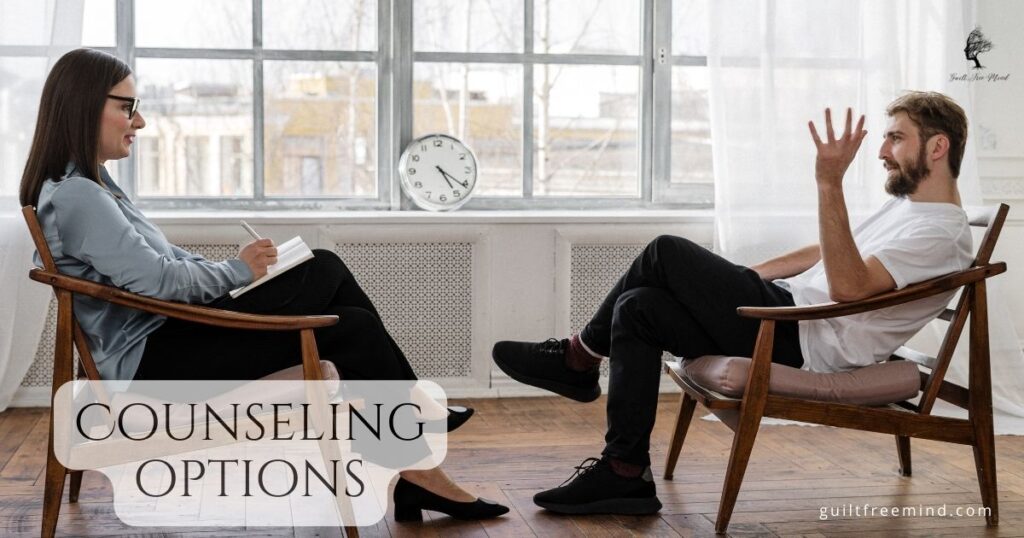
ACT
In ACT, or Acceptance and Commitment Therapy, mindfulness practices are integrated with CBT methods. It’s designed to aid people in coming to terms with their anxiety and acting in ways that further their ideals and goals. Those who practice acceptance and commitment therapy (ACT) learn to adapt to their anxious thoughts and feelings and move on with their lives.
DBT
DBT, or dialectical behavior therapy, was created to treat BPD but has now been proven to be useful in treating anxiety disorders as well. This method aids in emotional regulation, relational enhancement, and coping mechanism development, it includes individual treatment, skills training, and group support.
MBSR/MBCT
Mindfulness-based therapies like Mindfulness-Based Stress Reduction (MBSR) and Mindfulness-Based Cognitive Therapy (MBCT) can help in the alleviation of anxiety. These anxiety treatments encourage patients to practice mindfulness and acceptance of their inner experiences without passing judgment.
Psychodynamic therapy
A variety of factors, some of which psychodynamic treatment examines, can affect anxiety. It aids people in figuring out how to deal with the conflicts or traumas that are at the heart of their anxiety.
Counseling/talk therapy
Anxiety sufferers have a place to feel heard and understood when they seek out supportive counseling. The primary goals of counseling or talk therapy are to provide emotional assistance, validation, and direction in managing anxiety. Whether used alone or in conjunction with other therapies, supportive counseling can be very helpful.
Making an anxiety Toolkit to help with the coping mechanism
One effective strategy for dealing with worry and being there for others when they need it most is to compile a “toolkit.” When feeling anxious or overwhelmed, it might be helpful to have a collection of techniques, aids, and references at your disposal, which is what an anxiety toolkit is. You should have these in your arsenal against worry:
Breathing exercises:
During anxious moments, it can be helpful to have instructions for deep breathing exercises or relaxation techniques. Find the ideal breathing method by trying out a variety of approaches.
Grounding practices
When feelings of worry begin to surface, you can find relief by employing grounding practices. You can practice mindfulness by, for instance, describing your immediate environment or making a note of the sights, sounds, and textures around you.
Self-Care Tactics:
Think about what makes you happy and calms you down, then do more of it. Some examples of such activities are having a bath, doing yoga, going for a walk in the park, keeping a journal, reading a good book, or listening to soothing music.
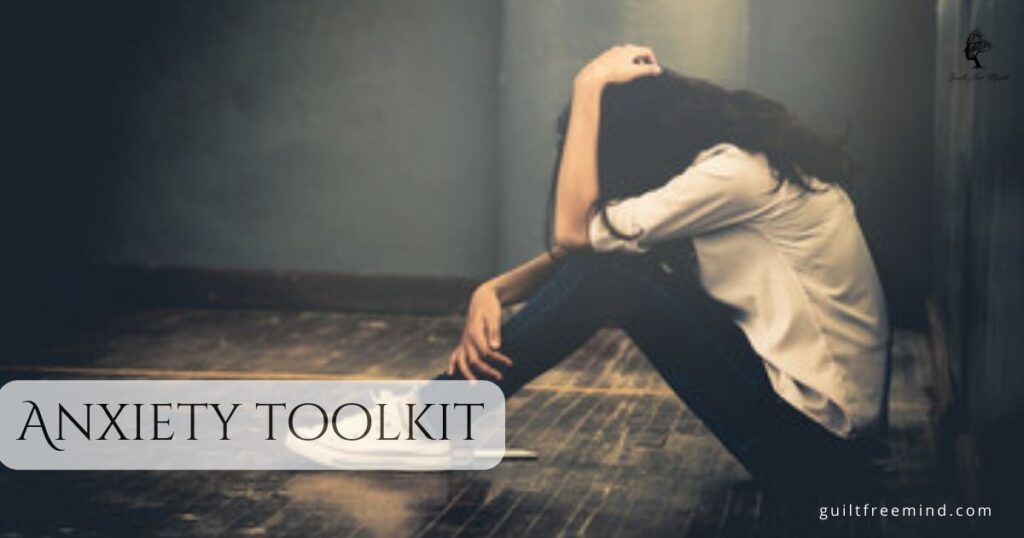
Positive affirmations and helpful resources for anxiety treatments
Create a collection of reassuring and upbeat statements that you can repeat to yourself in times of stress. Say to yourself things such as, “I am safe,” “I can handle this,” or “This feeling will pass.” Gather a collection of affirmations and statements that speak to you and can serve as a source of motivation when times are tough. Create visual aids or jot down notes to remind yourself.
Make a list of resources you know can be helpful in times of increased worry, such as helplines, support groups, online forums, and mental health applications.
Relaxation Activities
Activities that help you relax include things that can help you refocus and calm down. Anything that keeps your hands busy and your mind off of things works well as a stress ball, fidget toy, coloring book, or puzzle.
Tools for Relaxation
A portable speaker with relaxing music or a guided meditation, some essential oils for aromatherapy, and a pair of comfy earplugs or eye masks are all great additions to a relaxing space.
People list
Create a list of people you can reach out to in an emergency, such as close friends, family members, or mental health experts. Having more than one person on the list is crucial coz one person may not be available every time you have anxiety. Thus, if you have more people you can reach out to others for help as well.
Journaling
Keeping a journal can be a helpful tool for processing anxiety-related emotions and events. Take advantage of it as a means of introspection, development monitoring, and emotional release. This is one of the most efficient anxiety treatments you can do yourself.
Social support
If you need some moral support, try reaching out to people you know you can trust, whether they be friends, family, or support organizations. Talking to someone who can relate can help you feel less alone and gain new insights and perspectives.
Manage your time
Reduce your stress and anxiety by establishing a regular schedule and learning to manage your time wisely. Make time for yourself, relax, and take care of your needs by setting priorities and establishing reasonable goals. Try using some relaxation techniques like progressive muscle relaxation, guided imagery, or just listening to some soothing music or the sounds of nature to see what works best for you.
Managing Stress:
Pinpoint and lessen the impact of stress and anxiety-inducing triggers in your life. Setting limits, learning to speak up for yourself, and avoiding stressful circumstances are all ways to help. Don’t wait to contact a mental health professional if your anxiety continues or worsens to the point that you can’t function normally. You can count on them for advice, emotional backbone, and individualized treatment plans based on the best available scientific evidence.
How to Recognize the Signs That It’s Time to Seek Professional Anxiety Treatments
While it’s ultimately up to the individual, some symptoms and clues may imply it would be useful to contact a therapist or psychiatrist for anxiety. Some things to think about are as follows:
Severity and duration
The severity and duration of your symptoms are two indicators that it may be time to seek professional anxiety treatments. Examples include frequent panic episodes, extreme worry or terror, inability to rein in worrisome thoughts, and avoidance of circumstances that trigger anxiety.
Impact on regular life
You should get help from a professional if your anxiety is harming your relationships, productivity at work or school, ability to participate in social activities or general happiness. If you discover that your anxiety is interfering with your daily life or causing you extreme emotional discomfort, it may be time to seek help.
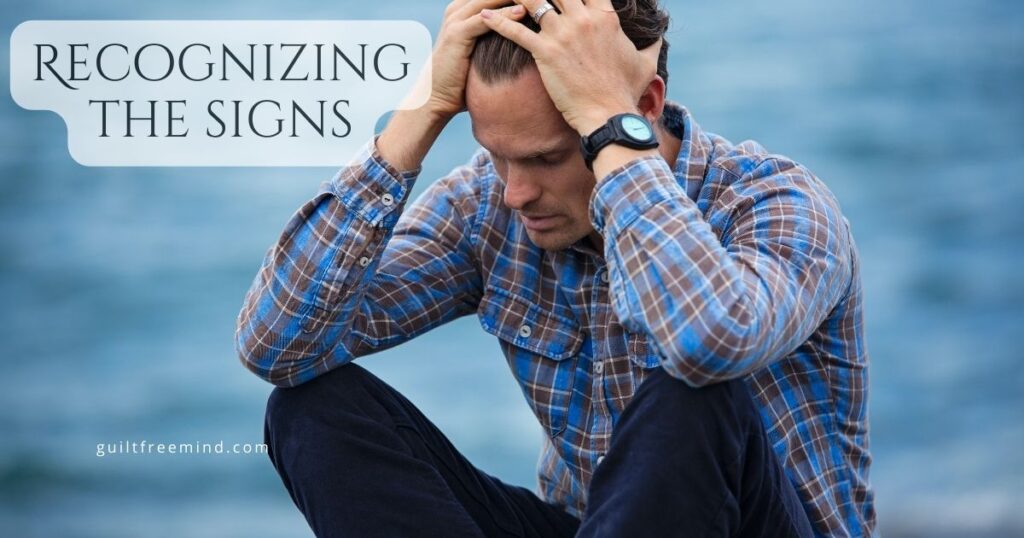
Self-help is ineffective
A need for professional aid can be inferred from the failure of different self-help strategies, such as relaxation exercises, lifestyle adjustments, and online resources, to alleviate the anxiety sufferer’s symptoms. Seeing a therapist or psychiatrist can help you get the individualized advice and tried-and-true therapies you need.
Reduced functional ability
If you’re having trouble with things like work, school, relationships, or even taking care of yourself because of your anxiety, it’s time to consult a mental health professional. This may manifest as an inability to focus, insomnia, impatience, or generalized anxiety that prevents one from functioning normally and carrying out daily tasks.
Presence of other conditions
Consult a mental health professional if you also suffer from depression, OCD, PTSD, substance abuse, and anxiety. To guarantee efficient administration, they can diagnose and treat any underlying illnesses.
Trauma
If you have a history of trauma or have just undergone a traumatic event, you must opt for professional anxiety treatments. Trauma can trigger anxiety, but talking to a therapist or psychiatrist can help you work through your feelings and learn effective coping strategies. If, despite your best efforts, you find it difficult to manage your anxiety symptoms on your own, it may be time to seek professional help. Professional mental health services such as therapy and medication might help you better understand and control your anxiety.
The take-home message on anxiety treatments
One can take back control of their life and feel better by investigating the root causes of their anxiety, trying out different anxiety treatments, and developing their own unique set of coping mechanisms. Cognitive behavioral therapy (CBT) is effective in the treatment of anxiety by assisting patients in recognizing unhelpful thought patterns, refuting them, and replacing them with more constructive ones. Relaxation methods, herbal medicines, and stress-reduction strategies are all examples of complementary therapies that can supplement conventional therapy methods.
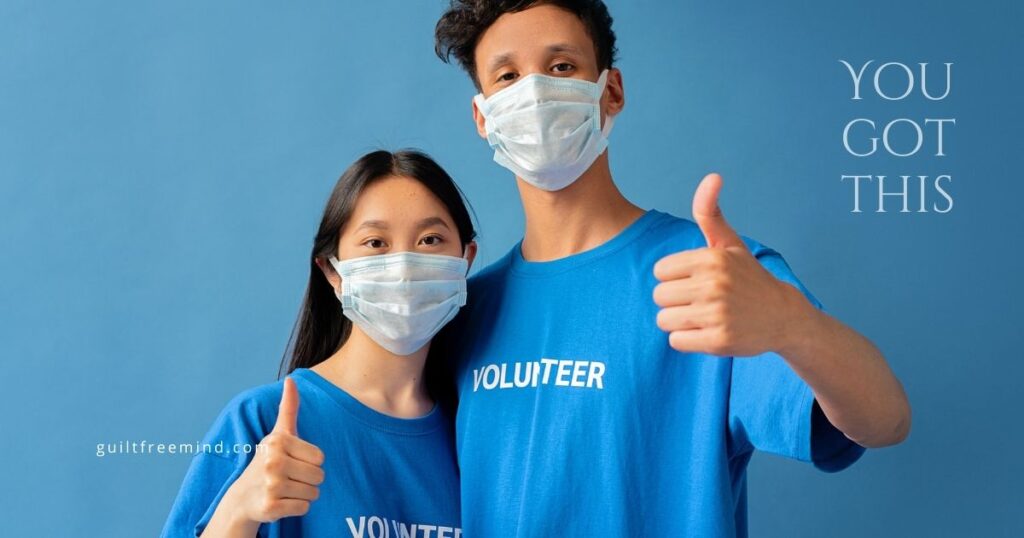
You can work on anxiety management on your own with the help of a toolkit that includes breathing exercises, grounding techniques, and self-care activities. Anxiety treatments can be made more effective by looking into different types of therapy and counseling, establishing a solid support system, and, if necessary, turning to medication. Recognizing that anxiety treatment is a process and committing to long-term methods like exercise, stress management, and self-care is essential for staying on the road to recovery.
If you have any queries or suggestions about anxiety treatments or any other on Guilt Free Mind, feel free to leave them in the comment section. In case you wish to be notified about the release of new blog posts, please subscribe to Guilt Free Mind. The subscription option is present in the sidebar. If you like to watch videos, please subscribe to the YouTube channel of Guilt Free Mind. Remember to ring the notification bell and set it to ALL.
See you in my next blog post
Frequently Asked Questions
Medications (such as selective serotonin reuptake inhibitors; SSRIs), talk therapy (such as cognitive-behavioral therapy; CBT), and self-help techniques are all commonly used to manage anxiety.
Therapy aids in the treatment of anxiety by equipping patients with techniques and methods for coping with their symptoms. They can figure out what’s bothering them, how to deal with it, and where to start fixing it.
Anxiety disorders treatment very commonly involves the use of selective serotonin reuptake inhibitors (SSRIs). They aid with mood regulation and anxiety symptoms by raising serotonin levels in the brain.
Symptoms of anxiety can be alleviated with the help of several natural cures and alternative treatments. Deep breathing exercises, meditation, and other forms of stress reduction, as well as the use of herbal remedies like valerian root and chamomile, may be helpful.
